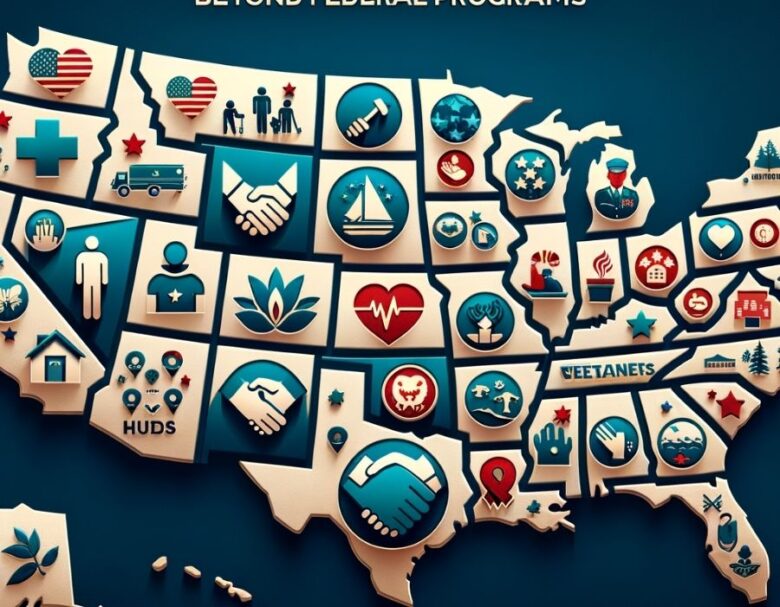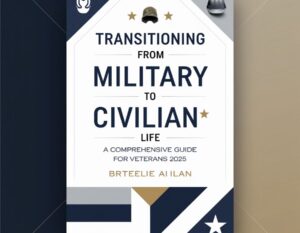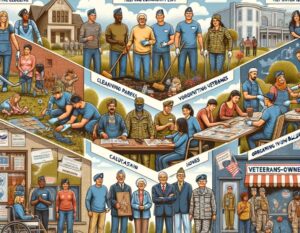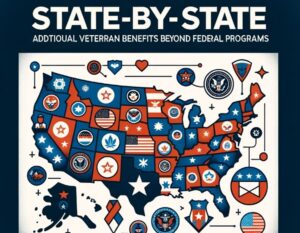Many veterans find that the desire to serve doesn’t end when they hang up their uniform. Volunteering can be a powerful way to continue serving, build new skills, and connect with your community. This guide explores various volunteer opportunities tailored for veterans, highlighting how you can leverage your unique experiences and skills to make a difference in civilian life.
Why Veterans Make Great Volunteers
Veterans bring a unique set of skills and experiences to volunteer roles.
Key Attributes of Veteran Volunteers:
- Leadership skills
- Teamwork experience
- Adaptability and problem-solving abilities
- Commitment to service
- Diverse technical skills
These attributes make veterans valuable assets in various volunteer roles.
Veteran-Focused Volunteer Organizations
Several organizations focus specifically on engaging veterans in volunteer work.
Notable Veteran Volunteer Organizations:
- Team Rubicon
- The Mission Continues
- Team Red, White & Blue
- Volunteers of America
- Wounded Warrior Project
These organizations offer structured volunteer opportunities tailored for veterans.
Disaster Response and Emergency Services
Veterans’ skills are particularly valuable in disaster response situations.
Disaster Response Volunteer Opportunities:
| Organization | Focus Area |
|---|---|
| Team Rubicon | Disaster relief and recovery |
| American Red Cross | Emergency response |
| National Voluntary Organizations Active in Disaster | Coordinated disaster response |
| FEMA Corps | Federal emergency management |
These roles allow veterans to use their crisis management and teamwork skills.
Mentoring and Youth Programs
Many veterans find fulfillment in mentoring young people and sharing their experiences.
Youth Mentoring Opportunities:
- Big Brothers Big Sisters Military Mentoring Program
- Boys & Girls Clubs of America Military Programs
- Student Veterans of America Mentorship Program
- Local school district volunteer programs
- Scout troop leadership
Mentoring allows veterans to pass on valuable life lessons and leadership skills.
Environmental Conservation
For veterans who enjoy the outdoors, conservation volunteering can be rewarding.
Environmental Volunteer Opportunities:
- National Park Service Volunteers-In-Parks program
- U.S. Forest Service Volunteer Program
- Local conservation corps
- State park volunteer programs
- Environmental cleanup initiatives
These roles often involve physical work and team coordination, familiar territory for many veterans.
Supporting Fellow Veterans
Many veterans choose to volunteer in support of other veterans and their families.
Veteran Support Volunteer Roles:
- VA Voluntary Service
- Disabled American Veterans (DAV) volunteer program
- USO volunteer opportunities
- Fisher House Foundation volunteers
- Local veteran support group facilitation
These roles allow veterans to directly impact the lives of their fellow service members.
Community Service and Development
Veterans can make a significant impact through general community service.
Community Service Opportunities:
- Habitat for Humanity
- Local food banks and soup kitchens
- Community clean-up initiatives
- Senior citizen support programs
- Local government advisory boards
These roles allow veterans to address a wide range of community needs.
Skills-Based Volunteering
Veterans can leverage their specific military skills in volunteer roles.
Skills-Based Volunteer Examples:
- IT support for nonprofits
- Logistics planning for charity events
- Leadership training for community organizations
- First aid instruction
- Project management for community initiatives
Skills-based volunteering allows veterans to use their specialized expertise.
Political and Civic Engagement
Many veterans continue their service through political and civic volunteering.
Civic Engagement Opportunities:
- Local election poll workers
- City council advisory committees
- Veteran policy advocacy groups
- Political campaign volunteers
- Community organizing initiatives
These roles allow veterans to shape policy and community decisions.
International Volunteer Opportunities
Some veterans choose to volunteer internationally, continuing their global service.
International Volunteer Organizations:
- Peace Corps
- International Rescue Committee
- Habitat for Humanity Global Village program
- Doctors Without Borders (for veterans with medical skills)
- Global Volunteers
International volunteering can provide new perspectives and challenges.
Virtual Volunteering
In the digital age, many volunteer opportunities can be done remotely.
Virtual Volunteer Roles:
- Crisis text line counselor
- Online tutoring and mentoring
- Social media management for nonprofits
- Virtual event planning
- Remote language translation services
Virtual volunteering offers flexibility and can be done from anywhere.
Finding the Right Volunteer Opportunity
Matching your skills and interests to the right opportunity is key to a fulfilling volunteer experience.
Steps to Find the Right Volunteer Role:
- Assess your skills and interests
- Determine how much time you can commit
- Research local and national opportunities
- Reach out to organizations that interest you
- Start with a short-term commitment to test the fit
Take time to find a role that aligns with your goals and abilities.
Frequently Asked Questions
Q: Do I need to be a combat veteran to volunteer with veteran-focused organizations? A: No, most organizations welcome veterans from all backgrounds and eras of service.
Q: Can I volunteer if I have a disability? A: Yes, many organizations have roles suitable for volunteers with various abilities and can provide accommodations.
Q: Will volunteering affect my VA benefits? A: Generally, no. However, if you’re receiving certain types of disability compensation, check with the VA about any potential impacts.
Q: Can I use my GI Bill benefits for volunteer work? A: In some cases, you may be able to use GI Bill benefits for certain volunteer programs that offer educational components.
Q: How do I list volunteer work on my resume? A: List volunteer work under a “Community Involvement” or “Volunteer Experience” section, highlighting skills and achievements relevant to your career goals.
Conclusion
Volunteering offers veterans a meaningful way to continue their legacy of service while building new skills, connections, and experiences in civilian life. The diverse array of volunteer opportunities available means that there’s likely a perfect fit for every veteran, regardless of their background, skills, or interests.
By volunteering, veterans not only contribute to their communities but also often find a sense of purpose and camaraderie that can ease the transition to civilian life. The leadership, teamwork, and problem-solving skills honed in the military make veterans invaluable assets to volunteer organizations across various sectors.
Whether you choose to leverage your military skills directly in disaster response or veteran support roles, or explore new areas of interest through community service or environmental conservation, your contribution as a veteran volunteer can have a significant impact. Your unique perspective and experiences can bring fresh insights and effective solutions to community challenges.
Remember that volunteering can also be a pathway to personal growth and career development. It’s an opportunity to explore new fields, build your network, and even discover new passions. Many veterans have found that their volunteer experiences led to new career opportunities or helped them identify new directions for their post-military lives.
As you explore volunteer opportunities, don’t hesitate to reach out to multiple organizations and try different roles. Finding the right fit may take time, but the rewards of finding a volunteer position that resonates with you can be immense.
Lastly, by volunteering, you continue to embody the values of service and commitment that defined your military career. You serve as a powerful example to others in your community, bridging the military-civilian divide and demonstrating the ongoing contributions of veterans to our society.
Your service to the nation didn’t end when you left the military – it simply took on a new form. Through volunteering, you have the opportunity to write a new chapter of service, one that continues to make a profound difference in the lives of others and in your community. Embrace this opportunity to serve in new ways, and let your volunteer journey be as impactful and fulfilling as your military service.




